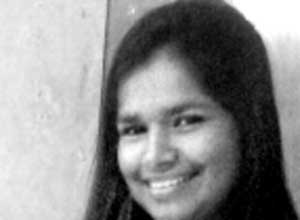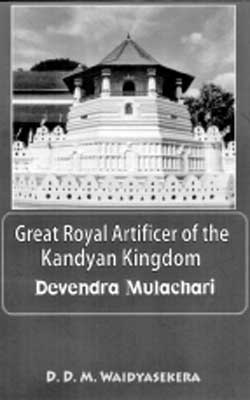Thursday Feb 26, 2026
Thursday Feb 26, 2026
Saturday, 13 January 2018 00:00 - - {{hitsCtrl.values.hits}}
 By Thilinika Wijesinghe
By Thilinika Wijesinghe
In the over-2,500-year-old history of Sri Lanka, Kandy and the Kandyan Kingdom has played a historic role in maintaining the sovereignty and culture of Sri Lanka. The Kingdom is well known for its ancient historical monuments, unique architecture, carvings, arts and crafts, paintings among others which constitute the core of Sri Lankan civilisation and culture.
While they were built under the patronage of the Kandyan Kings, credit accrues not only to the workmen themselves whose services were provided under the prevailing ‘Rajakariya’ system but also to the various artificers, designers, craftsmen, painters and other who contributed to their construction.
This book is a historical research study of the life and work of one of its brilliant artificers and designers Devendra Mulachari who contributed to the designing and construction of a number of prominent monuments in the Kandyan Kingdom. His achievements include the picturesque ‘Pattiripuwwa’ of The Dalada Maligawa, The ‘cloud Wall’, ‘Kirimuhuda’ of Kandy Lake, ‘Magul Maduwa’, or Audience Hall apart from a number of Vihares, Maduwas, Carvings etc. that dotted the Kandyan Kingdom. He lived and worked under three kings, Kirthi Sri Rajasinghe (1747-1782), Rajaadhi Rajasinghe (1782-1798) and Sri Wickrema Rajasinghe (1798-1815).
However, little is known or has been written about his life and work and his achievements have not received the due recognition that they deserve. As Ananda Coomaraswamy states, ‘The names of artificers are not recorded in their work nor as a rule remembered except by their own descendants’. Coomaraswamy, ‘Medieval Sinhalese Art’ (P.59).
It is in this context that the author has done considerable research into the origins, life and work, his demise and the descendants if this remarkable personality. A number of books and research work of reputed scholars and writers such as Ananda Coomaraswamy, H. W. Codrington, John D’Oyly, Robert Knox, A. C. Lawrie, H. C. P. Bell and articles and works of others such as Prof. J. B. Dissanayake, S. A. Karunaratne, S. K. Jayawaredena, Somapala Wijesundera to mention a few, have been the basis of the author’s research on this topic. All these have been acknowledged in the relevant places and in the References in the book.
The Foreword is written by the reputed scholar and researcher Prof. K. D. Paranavitana, former Deputy Director of the National Archives.
Facts have also been secured from old law records in the Kandy Archives, Colombo Archives, National Museum and Royal Asiatic Society as well as photos and anecdotes from others including his current descendants. A unique feature is the reproduction of a wood carving of the Mulachari in official attire given in the book.
The Appendix contains a number of old relevant ‘Sannasas’, Judicial Commissioner’s Court Proceedings of 1817 and 1824 among others including a copy of the 1815 Kandyan Convention.
 A brief resume of the author’s findings on Devendra Mulachari has earlier been provided in a chapter in his book. ‘The royal Artificers of Mangalagama and their Descendants’ but as per numerous requests and on the basis of more research, this separate volume has been compiled.
A brief resume of the author’s findings on Devendra Mulachari has earlier been provided in a chapter in his book. ‘The royal Artificers of Mangalagama and their Descendants’ but as per numerous requests and on the basis of more research, this separate volume has been compiled.
Chapter I deals with the origins and ancestry of the clan of artificers who are descendants of a race of Aryans who entered India across the Punjab long before Vyasa began the collection of the Vedas. They are known as Vishwa Brahamins or Deva Brahmins and their trade is as old as the Rigveda. Their mythical ancestor is Vishwakarma and their flag is the Hanuman Flag shown and described in the chapter. The gold and silver artificers formed 4 workshops under the supervision of a Mulachari who as Prof. Tennakoon Vimalanda stated was an expert in at least 5 arts and crafts.
The Chapter also deals with the ancestry of Devendra Mulachari who was born probably around AD 1747 during the reign of King Kirthi Sri Rajasinha. A number of theories as to his exact place of birth and origin is discussed put forward by such writers as Mirando Obeysekera, Prof. Jayadeva Tilakasiri and A.C. Lawrie’s Gazetteer.
His earliest architectural works the ‘Mideniya Maduwa’ at Mideniya near Kandy and the ‘Pekada Kammala’ in Kotmale are described in Chapter 2. His most outstanding work was the designing and building of the ‘Pattirippuwa’ commencing in 1800 and completing within 2 years in 1802 and is described in Chapter 3 while the construction of the Cloud Wall, the Kandy Lake in 1807, the Diyarella Bemma are given in Chapter 4 followed by a description and details of the building of the Audience Hall in Chapter 5. His other contributions such as Degaldoruwa as well as arts and carvings at Embekke are described in the next chapter and which contains a number of paintings and carvings as illustrations.
Chapter 7 deals with his position and life in the kandyan Court, gifts and ‘Sannasas’ received by him and described, especially his official attire complete with his unique ‘Riyan Danda’ which he carried like a walking stick to distinguish himself from the other Adigars and Courtiers. His family and residence are also described in the chapter. Chapter 8 deals with his demise while still engaged in constructing the Magul Maduwa amidst court intrigue which led to his death.
His relations and associates are given in Chapter 9 which includes a section on the Venerable Weliwita Sri Saranankara Sangharaja thero and Wilbagedera Muhandiram who were chiefly responsible for bringing the ‘Upasampadawa’ from Siam in 1753. Details of his recent descendants are provided in the final Chapter 10 which contains a Genealogy Chart of his descendants.
All in all the contents of the book would be of great interest to scholars, historians, social scientists, students and the general public alike.
A Stamford Lake publication, the book is available at all leading bookshops.
(Thilinika Wijesinghe holds her BA in Journalism from the Bangalore University and MA in International Relations from the University of Colombo. She is currently working in the field of digital marketing in Sri Lanka.)
Book review
Great Royal Artificer of the Kandyan Kingdom – Devendra Mulachari
By D. D. M. Waidyasekera 2017,
A Stamford Lake Publication, pp.134